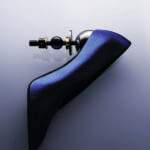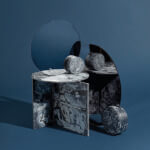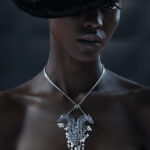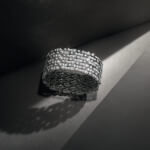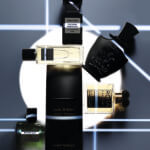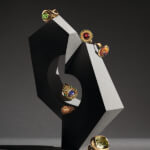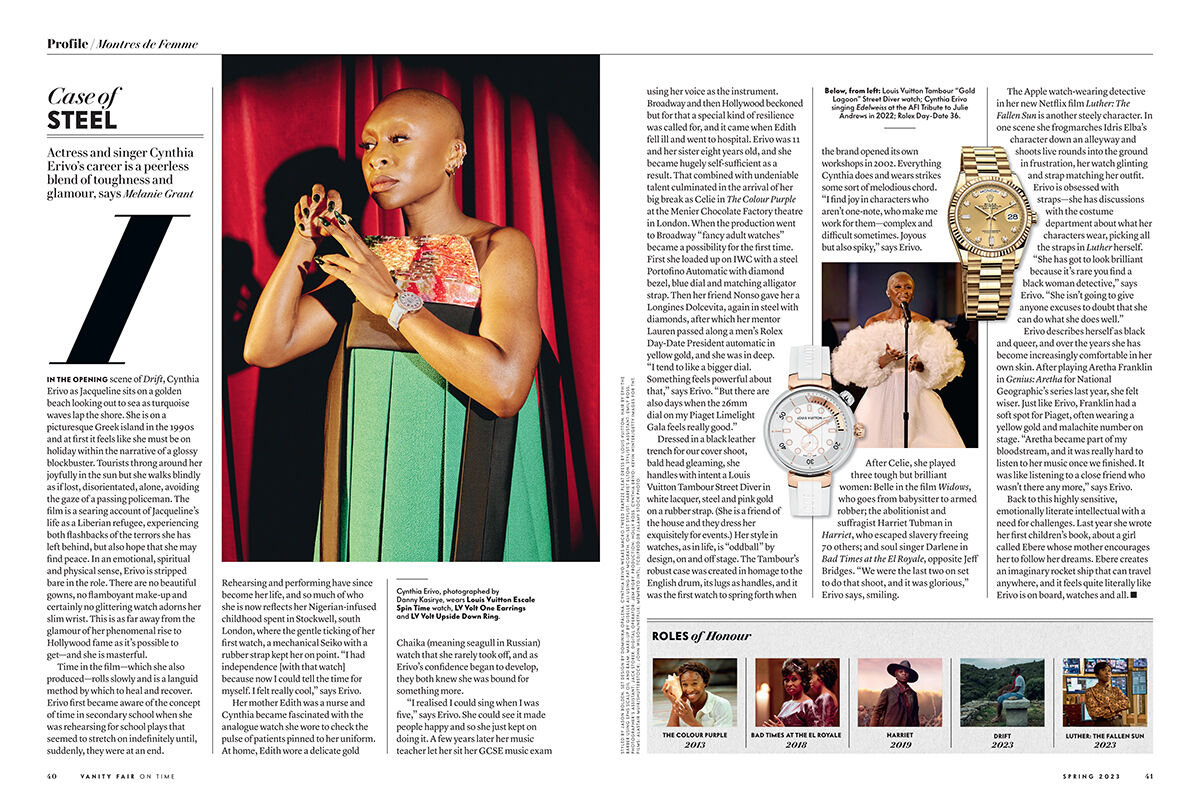
Cover Feature
In the opening scene of Drift, Cynthia Erivo as Jacqueline sits on a golden beach looking out to sea on a picturesque Greek Island in the 1990s. At first it feels like she must be on holiday as tourists throng around her joyfully in the sun but she walks blindly as if lost, disorientated and alone. Occasionally she avoids the gaze of a passing policeman and Drift turns out to be a searing account of Jacqueline’s life as a Liberian refugee, experiencing both flash backs of the terrors she has left behind but also hope that she may find peace. There are no beautiful gowns, no flamboyant makeup and certainly no glittering watch adorns her slim wrist. This is as far away from the glamour of her phenomenal rise to Hollywood fame as it’s possible to get and she is masterful.
Time in the film rolls slowly and is a languid method by which to heal and recover. Erivo first became aware of the concept of time in secondary school, rehearsing school plays that seemed to stretch on infinitely until, suddenly they were at an end. Rehearsing and performing have since become her life and so much of who she is now reflects her Nigerian infused childhood spent in Stockwell, South London where the gentle ticking of her first watch, a mechanical Seiko perched on a rubber strap kept her on point. “I had independence (with that watch) because now I could tell the time for myself”, she says with a hint of nostalgia. “I felt really cool.” Her mother Edith was a nurse and Cynthia became fascinated with the analogue watch she wore to check the pulse of patients pinned to her uniform. At home Edith wore a delicate gold Chaika or ‘Seagull’ watch that she rarely took off and as Cynthia’s sense of self began to form, they both knew that she was bound for something more.
“I realized I could sing. When I was five.” She could see it made people happy and so she just kept on doing it. A few years later, she was singing complex harmonies with a spine-tingling effortlessness that compelled her music teacher to let her sit her GCSE music exam using her voice as the instrument. When she was eleven her mum fell ill and went to hospital and she became hugely self-sufficient as a result. That combined with undeniable talent culminated in the arrival of her big break as Cellie in The Colour Purple at a London theatre called the Menier Chocolate Factory. When the production went to Broadway, ‘fancy adult watches’ became a possibility for the first time. First she loaded up on IWC with a Portofino Automatic in steel with diamond bezel, fetching blue dial and matching alligator strap. Then her friend Nonso gave her a Longine Dolcevita, again in steel with diamonds, after which her mentor Lauren passed along a men’s Rolex Day-Date President automatic in yellow gold and she was in deep. “I tend to like a bigger dial. Something feels powerful about that.” She muses. “But then there are days when the 26mm dial on my Piaget Limelight Gala feels really good.”
She woman-handles a Louis Vuitton Tambour Spin Time Air Vivienne in lacquer, diamonds and pink gold (she is a friend of the house and they dress her exquisitely for events) on the cover photoshoot with intent, dressed in a black leather trench, bald head gleaming. Her style in watches as in life is ‘oddball’ by design – on and off-stage. The Tambour’s robust case shape was created in homage to the English drum, it’s lugs as handles and it was the first watch to spring forth when the brand opened its own workshops in 2002. Everything Cynthia does and wears strikes some sort of melodious cord. “I find joy in characters who aren’t one note, who make me work for them. That are complex and difficult sometimes, and joyous, but also spiky.” She notes. After Celie, she played three tough but brilliant women. Babysitter turned arm robber called Belle in the film Widows. The abolitionist and Suffragette Harriet Tubman in the film Harriet and finally badass soul singer Darlene in Bad Days at the El Royale opposite the rather magnificent Jeff Bridges. “We were the last two on set to do that shoot, and it was glorious.” She smiles. Drift was the first time that she starred and produced, recalling how terrifying it was. She couldn’t resist playing such a vulnerable young black woman who, if fate had been crueller, could have been her. She excels at bringing outsiders to light whom society often underestimates.
The Apple watch wearing detective Detective Superintendent Raine in her new Netflix film Luther: The Fallen Sun is another steely character with boss lady vibes. She has in-depth discussions with the costume department about what her characters wear picking all the straps in Luther herself. “She has got to look brilliant because its rare you find a black woman detective so she isn’t going to give anyone excuses to doubt that she can do what she does well.” She asserts. Erivo describes herself as black and queer and over the years has become increasingly comfortable in her own skin. She has stopped worrying about how others perceive her putting that energy into her work, running down the likes of rubber-faced villain Andy Serkis in Luther. Being a black woman in Hollywood has also taught her a lot about perseverance and she is determined to use her success to help others, having her often hair, makeup and styling teams written into her film contracts.
Sometimes, when she is in character, in costume and on set she tunes into the person she’s playing to such a degree that when filming ends, she is mentally and physically exhausted. “I had a little mini breakdown one day once the filming of Harriet had finished. I just realized that I’d been holding it really tight. And so had to just cry it out and let it go.” She says quietly. Playing someone real requires a spiritual connection that can be hard to shake. She played Aretha Franklin in ‘Genius: Aretha’ for National Geographic’s anthology series last year but after Harriet was wiser and detached herself entirely once filming had commenced. Just like Erivo, Franklin had a soft spot for Piaget, often wearing a yellow gold and malachite number on stage. “She became part of my bloodstream, and it was really hard to listen to her music once we finished filming. It was like listening to a close friend who wasn’t there anymore.”
Behind all the star power sits a highly sensitive, emotionally literate intellectual with an on-going need for bigger and more profound challenges. Erivo would like one day to complete a PHD in speech psychology. “How we use our voices, both spoken and sung affects how we give and receive information. Vocal texture affects us socially and psychologically and I think the voice holds a lot of answers.” She says and she should know. While researching Franklin’s life, Erivo discovered she spoke so quietly that others had to lean in, surrendering to her power. Erivo is still quite a few octaves above that but in Drift, she is very softly spoken which only adds to her magnetism. There are echoes here of so many of the tough yet vulnerable characters she inhabits. Women who are fighting for a better life despite the odds. Last year she wrote her first Children’s book about a girl called Ebere whose mother encourages her to follow the biggest dreams possible. Ebere creates an imaginary rocket ship that can travel anywhere in the universe and it feels quite literally like Erivo is onboard, watches and all.
Written by Melanie Grant for Vanity Fair on Time in May for the Spring issue 2023.

